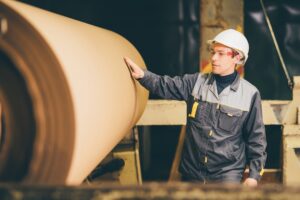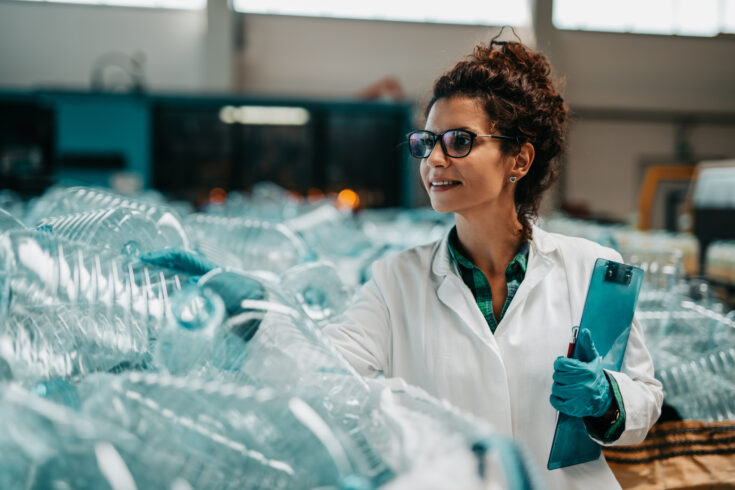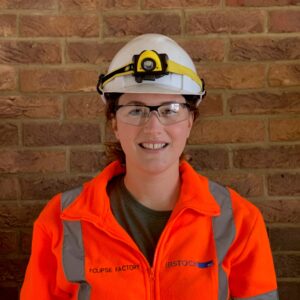We all know the issues the world faces, including:
- growing population
- climate
- shortage of resources
- supply chain
- the transition to a net-zero carbon economy.
The public wants change, and governments worldwide are driving the sustainability agenda. The foundation industries have a major part to play in our future by building faster, more efficiently and more sustainably.
Our industries need to find a constructive way forward. There are many ways to do this, but we need to start thinking now. We also can’t solve this individually, we need to collaborate, which is the idea behind the Future Leaders Group (FLG). The FLG brings together people from all the foundation industries:
- glass
- chemicals
- ceramics
- metals
- paper
- cement.
The objective of the group is to transform our foundation industries so that they are internationally competitive in manufacturing products vital for our economy in an environmentally sustainable way.
That’s a huge task, so it was with a bit of trepidation that I joined the group. I asked myself questions:
- who’d be there?
- what would they be like?
- were they feeling the same nerves as me?
- what skills and experience would they bring to the project?
Meet the team
I found out pretty quickly that the group was represented by a hugely engaged and diverse set of individuals. As they’re representing our industries, it’s worth giving a quick overview of the personalities and their particular challenges.
The glass case
Starting with glass manufacturing, a traditionally energy-intensive process due to the high temperature production methods. To date over £7 million of funding has been secured to help progress the long-term decarbonisation plan and improve the environmental credentials of glass making. Other challenges include competition from imported products, especially at the lower value end of the market.
The glass ‘case’ is being made by Aston Fuller and Lara Edison. Aston is the General Manager of Glass Futures Ltd, a research and technology organisation focused on tackling big industry issues such as:
- sustainability
- the drive for net zero.
An engineer, Lara oversees raw material and melting activities for Encirc and has a real interest in cross sector knowledge sharing and the circular economy.
The chemicals team
Chemical manufacturing covers everything from pharmaceuticals to plastics. The UK is one of the world’s largest producers of chemicals, with the EU as a major market. The chemicals industry invests heavily in research and development (R&D), to circa £4 billion per year. This has resulted in continuous improvement, with a 40% decrease in energy consumption since 2007. Their main challenges are a skills shortage and volatile energy costs.

Credit: Ugurhan Betin / Getty Images
This sector is represented by Hallam Wheatley and Kyra Sedransk Campbell. Hallam is a Marketing Development and Technical Support Engineer with SABIC, where he’s currently focused on sustainability. Kyra Sedransk Campbell is an Engineering and Physical Sciences Research Council Dorothy Hodgkin Research Fellow and Lecturer, and co-founder and CTO of Nanomox. Kyra is especially interested in improving the links between educational pathways and careers in the foundation industries.
Ceramic duo
Even though ceramics covers everything from medical applications to house bricks, it is the smallest of the foundation industries, and there’s been a big decrease in UK manufacturers, down to 350 from 470 (2009-2016). This is mainly because of overseas competition from abroad, especially from the low-cost high-volume products such as bricks and tiles. Despite this, there’s been a resurgence in ceramic manufacturing in recent years, partly due to a rising demand for housing and, more surprisingly, tableware.

Credit: ArtistGNDphotography / Getty Images
The two reps from this sector are Stephanie Palmer and yours truly, Imogen Harding. Currently, Stephanie is Head of Sustainability for Wienerberger where she’s focused on reducing the resource intensity of production. As for me, I’m a Factory Manager for Ibstock Brick with a real commitment to changing perceptions about the brick industry and ensuring we’ve got the right skills-set for the future.
The metals industry
Metal production has traditionally been a large part of UK manufacturing, and currently employs circa 69,000 people in the UK. There is a huge demand for metal for both infrastructure products and supplying fabricated materials to other industries, such as:
- automotive
- aerospace.
Research and development spend is dependent on which sub-sector of the metals industry you are in, typically fabricated metal producers are spending £0.2bn a year, whilst there is no reported capital R&D spend at all for iron and steel casting. British Steel has struggled in the last couple of years to compete with foreign markets, and there has been a couple of high-profile plant closures. But, other organisations have invested heavily in the UK, such as Tata Steel investing more than £1.9 billion since 2007 to upgrade plant and technology at its UK operations.
Metal production is represented by two Michaels. Senior Metallurgist, Michael Agyeman, works for Mettis Aerospace, and is keen to promote best practise and share experiences by fostering cross industry relationships. Michael Kenyon, a Materials Scientist at Innoval Technology is interested in advancing the sustainability performance of aluminium alloys.
The paper manufacturers
The next industry is paper production, represented in the Future Leaders Group by Rachael Tierney and Zach Stanford. Paper is unique among the foundation industries in the UK because typically 70% of recycled or recovered cellulose fibre is used to make new paper products. This level of resource efficiency is rare, and something to be celebrated.

Credit: agnormark / Getty Images
Paper products include:
- bank notes
- magazines
- packaging.
A quarter of products produced in the UK are exported.
There is a challenge from foreign paper producers, as the UK is less cost efficient due to higher electricity costs and more stringent energy policies.
Rachael works for Arjowiggins Scotland as a lab technician where part of her role is to help reduce waste and making processes more energy efficient.
Zach, the other representative from the paper industry is Technical Assistant to the Operations Manager at Palm Paper. His role includes commissioning of the new combined heat and power plant and gas fired oil heating system, amongst other process optimisation projects.
Cementing the group
The final sector is cement production, represented by Veronika Elfmarkova and Xinyuan Ke. Cement exports are traditionally very low, with 97% of output for immediate consumption. One of the earliest industries to tackle carbon emissions in an energy intensive process, the sector has achieved a 50% reduction since 1990. There is high potential for growth within this industry, related to planned expansion of UK infrastructure.
Veronika Elfmarkova is the ECOPact Product Manager for London Concrete Ltd where she helps develop sustainable cementitious binders and low carbon concrete. She is interested in finding ways to use waste or secondary materials from other Foundation Industries in Concrete production. Xinyuan Ke developed a novel route to utilise waste from the aluminium industry to produce alternative cement. This led her to academia, where she’s now a lecturer in Sustainable Materials for Construction at the University of Bath, with a specific interest in improving materials efficiency.
Connecting the dots
Our final two members sit across the foundation industries looking at cross-cutting technologies. Thomas Kirk is the founder and CEO of Foresight Data Machines Ltd, which supplies technology to help improve the efficiency, productivity and quality of processes. He’d like to see the foundation industries become a more attractive prospect to top talent in STEM subjects. Lucy Smith is the Principal Researcher in Circular Economy at the Materials Processing Institute. Lucy started her career in Industry, and then completed a PhD in Material Sustainability before becoming a Principal Researcher, working on projects that include:
- increasing the utilisation of scrap
- developing new recycling processes.
So that’s a very quick whistle-stop tour of the people who sat around the table at our first meeting, and it’s clear future proofing the industry in terms of skills and sustainability have a big representation. Either way, there’s a huge amount of experience, skills and commitment and I think I speak for everyone when I say we’re looking forward to sharing, learning and driving the agenda. If anyone has any thoughts or ideas, let us know.
Top image: Credit: Group4 Studio / Getty Images




